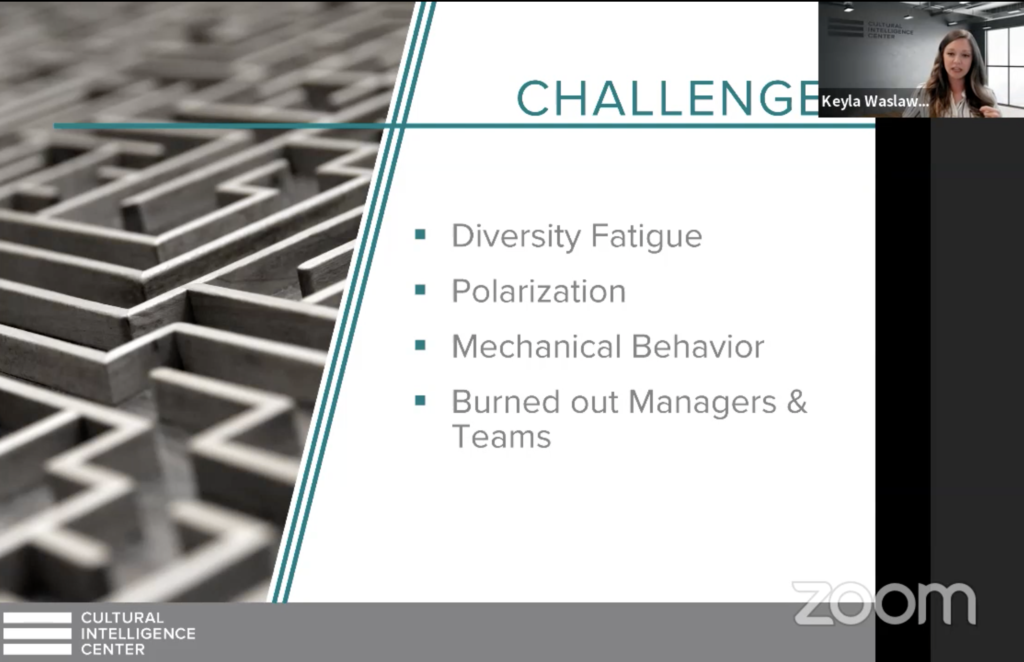This article first appeared on fromdayone.co on 21 June 2022.
Talent management these days can feel like an endless cycle of attracting and welcoming new hires into the workplace, only to be followed by frustration when those employees leave just as it seemed they were settling in.
The Great Resignation, which goes by many names, has seen record numbers of Americans quit their jobs over the past two years, even as employers spend billions developing programs to encourage them to stay.
High on the list of reasons why workers move on from an organization is a feeling of not belonging, Keyla Waslawski, a VP of sales and marketing with the Cultural Intelligence Center, said in a presentation at From Day One’s June virtual conference on bringing more inclusive approaches to diversity.
Waslawski advocates for a strategy that uses the framework of cultural intelligence to tackle the challenges of employee retention. That calls for confronting one of the thornier, unintended problems employers are coming up against: diversity fatigue.
U.S. businesses spend an estimated $8 billion a year on diversity, equity and inclusion (DEI) training, in hopes of unlocking the potential of those crucial goals. But some of those efforts are falling flat, because to employees they often they feel forced, uncomfortable or, worse yet, polarizing, Waslawski said.

“We recognize the importance of building the right culture, one that promotes inclusion, and yet we still see record high resignations, we still have managers who are burned out, we still see our talent leave as fast as we find it. As leaders, then, it’s up to us to change our approach so that we can build effective inclusion programs,” she said.
Programs that focus on evaluation, rather than on bringing people together, increase feelings of polarization, Waslawski said. Initiatives that emphasize awareness and facts rather than adaptability and action can lead to mechanical, unnatural interactions between colleagues because they reinforce stereotypes instead of allowing unique individuals to get to know one another.
Systematic inclusion, however, can be hard work. Burnout among managers often stems from efforts to bring together, in a productive way, a group of people who think and work very differently.
Waslawski shared her own story of frustration involving a team member who never followed through with an approach to a project once it was agreed upon in a meeting. The employee would nod in agreement, then go in a different direction afterward. “It was driving me nuts,” she said. “I was expected to finish projects as the leader of the department, and I couldn’t seem to get on the same page as my team.”
By researching the employee’s cultural values, Waslawski found that her team member preferred a chain-of-command hierarchy and was uncomfortable expressing an opposing view in a group. She asked her colleague after a meeting to follow up with an agreement in writing. “This simple change changed everything. It allowed her not to disagree in person, but in the safety of our one-on-one interaction,” Waslawski said.
Waslawski drew upon her own cultural intelligence to solve the dilemma she faced when running her staff meetings. “I learned not how to manage those meetings differently, but rather how to leverage the different voices I had at the table,” she said.
Cultural intelligence, said Waslawski, values the uniqueness and authenticity of the individual and supports belonging within a working group without forcing assimilation. It allows people to engage effectively with others from different cultural backgrounds, encompassing nationality, ethnicity, age, gender and even function.
“To be a truly inclusive culture,” she said, “we have to approach our initiatives in a way that supports uniqueness and belonging simultaneously. If we want our talent to stay, we need to ensure our people are accepted and accepting.”
Waslawski outlined four components of cultural intelligence:
Drive: The motivation and confidence to engage with others who are different.
Knowledge: The understanding of cultural differences.
Strategy: Considering and preparing for cultural differences before an interaction.
Action: Behavioral flexibility.
“When pulling all four of these together, cultural intelligence allows us to build the foundation of an inclusive culture, where individuals and teams feel they belong as who they are, because it taps into what’s personal in each of us–our own motivations, knowledge, our values,” she said.

To use cultural intelligence to retain talent, learning should focus on differences beneath the surface rather than on those that are obvious–such as skin color, gender and age–and tend to be polarizing. “If we focus on differences at the core, how we’re raised differently, even in our own homes neighbor to neighbor, it allows us to take a culturally intelligent approach and focus on who we are, not how we look,” Waslawski said.
Build organizations by adding what’s missing from the culture, she advised, rather than bringing in people who fit in or add more of what’s already working.
Leveraging the capabilities of cultural intelligence can develop unconscious inclusion that is flexible and focused on the needs of others, fostering an environment of trust in complex, multicultural situations, Waslawski said. The flexibility of the approach aims to move people beyond awareness and into action.
Because it is malleable, cultural intelligence is a skill that is in each individual and can be improved upon. It’s an approach that does not need to be driven from the top down to succeed, and it is focused on development, not evaluation, Waslawski emphasized. Two decades of research shows that people with higher levels of cultural intelligence are more adaptable, make better decisions and negotiate more effectively, she said. The result is more innovation, creativity and sharing of ideas.
“In other words, cultural intelligence allows us to unlock diversity’s promise to us,” she said.
Editor’s note: From Day One thanks our partner, Cultural Intelligence Center, who sponsored this Thought Leadership Spotlight.
To read the original article, please click here.
The Cultural Intelligence Center is proud to support organizations such as From Day One, which is on a mission to bring about innovative ways for companies to foster stronger relationships with their employees, customers, and communities.
About the Cultural Intelligence Center
The Cultural Intelligence Center is an innovative, research-based training and consulting firm that draws upon empirical findings to help organizations and individuals around the world assess and improve cultural intelligence (CQ)- the ability to work effectively with people from different nationalities, ethnicities, age groups, and more. We provide you with innovative solutions that improve multicultural performance based on rigorous academic research. More information about the Cultural Intelligence Center can be found on our website.